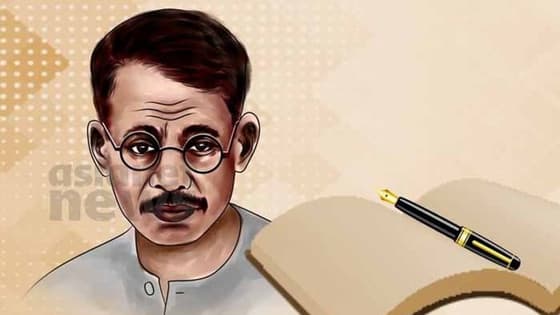
India@75: Ganesh Shankar Vidyarthi, the Lion of Kanpur
Ganesh Shankar Vidyarthi's fearless journalism brought numerous cases, fines and prison sentences.
A journalist was named the lion of Kanpur. He fought for freedom and became a martyr for Hindu-Muslim unity. He was the founder editor of Pratap, the Hindi publication that was the firebrand mouthpiece of the freedom struggle and the oppressed people. He was the legendary Ganesh Shankar Vidyarthi.

Ganesh Shankar was born in Fatehpur near Allahabad to a low-income family in 1890. He could not go beyond school education and started working early in life. He published his first book at 16 and got into journalism. He was associated with influential nationalist periodicals like Karmayogi and Swarajya.
Vidyarthi is the pen name Ganesh chose to write his influential articles. At 21, Vidyarthi joined Saraswathi, the famed literary publication led by the doyen of Hindi journalism Mahaveer Prasad Dwivedi. But Vidyarthi could not keep away from political journalism.
In 1913 he founded Pratap, which soon became known for his revolutionary journalism for the cause of not just the country's freedom but the scheduled castes, mill workers, and peasants and Hindu-Muslim harmony.
Vidyarthi's fearless journalism brought numerous cases, fines and prison sentences. In 1916 Vidyarthi met Gandhi and became active in the freedom struggle. He organised Kanpur's first mill workers' strike.
Also watch: India@75: Perungamanallur, Jallianwala Bagh of the South
For a sensational speech, Vidyarthi was booked for sedition and jailed. On his release, he met Bhagat Singh and other comrades and became their close ally. In 1926 he was elected from kanpur to the legislative assembly and soon became the President of the Uttar Pradesh Congress Committee. Vidyarthi was arrested again in 1930 for leading salt satyagraha. He was for radicalising the Congress party by championing the cause of the poor. He set up an ashram at Narwal to propagate Khadi.
In 1931 violent communal clashes broke out in Kanpur between Hindus and Muslims. Vidyarthi jumped into the midst of these clashes to bring peace between the warring communities and was stabbed to death by unknown miscreants. His family believed that the hoodlums hired by the British authorities were behind his murder. He was the bridge between the Congress party and revolutionaries like Bhagat Singh. "Vidyarthi's blood would cement the ties between Hindus and Muslims", observed Gandhiji.
Also Read: Remembering Vikram Sarabhai, the father of Indian space program